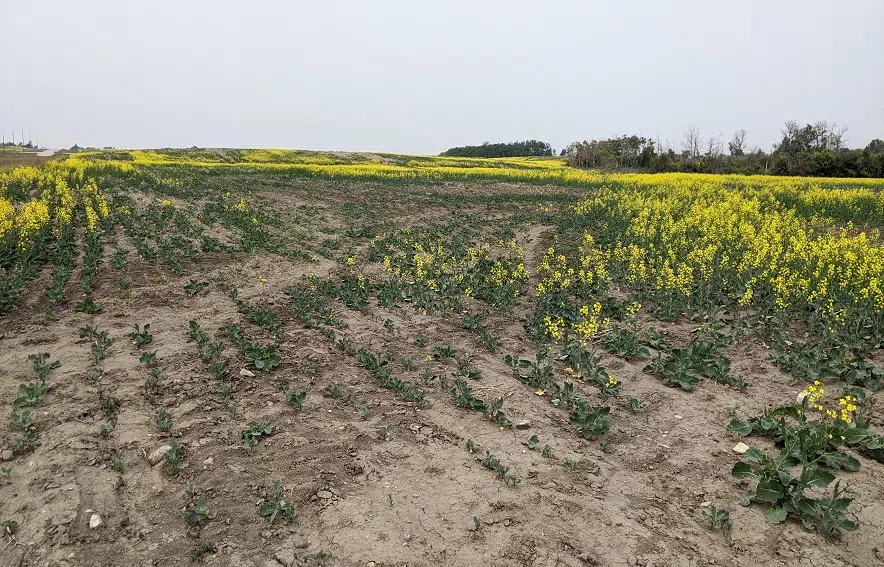Ben Wilson says this summer’s drought is one of the worst he’s ever seen in Dundurn.
Wilson, the deputy reeve for the rural municipality of Dundurn, says the most comparable drought years were in 1988 and in the early 2000s.
He said the lack of rain has been annoying, as other areas around Dundurn have received rain, but his municipality has not.
“It’s very frustrating. You watch (the rain) on the radar and you see it coming and it either disappears or goes around you,” he said Thursday.
Over in the Lancer area, farmer Jim Hale said this hasn’t been the driest season, but it’s definitely up there.
“We are getting the odd little bit of rain, so there’s areas that are definitely worse off than us — but there are areas that are better off than us,” he said.
One part of the province has struggled more than the rest, said Devon Walker, the District 6 director for the Agricultural Producers Association of Saskatchewan (APAS).
“Central, west-central and southwestern parts of the province are struggling the most,” said Walker.
According to Wilson, dry conditions over the last several summers have led to grasshoppers infesting fields around the province. That’s part of the reason why the municipality has declared an agricultural disaster.
“(The grasshoppers) came up here with a vengeance and cleaned off a lot of stuff before we even had the chance to graze it,” Wilson said as he stared into his dry farm field which should be brimming with crops.
“They’ll eat anything they can get ahold of. If they like it, they’ll eat it.”
Hale also said grasshoppers have been an issue this year. There have been more of them this year, Hale said, and they started earlier.
“They don’t really bother peas or oats but they do attack lentils when they flower,” Hale said. “They don’t really chew on the plant, they just wreck them when they are trying to make seed.”
While the last couple years have been warm, Wilson mentioned farmers in his area would typically get a break in the weather every now and then.
But this summer, they haven’t caught any breaks, which has caused them trouble.
“This year, it’s been right from start to finish. We were trying to save pasture for the cows and by the time we got the cows there, (the crop) was chewed off already,” Wilson explained.
According to Wilson, there also have been problems with his canola. While the crops look pretty, he noted they aren’t looking how they should for this time of the year.
“Yeah, there’s flowers there, but there’s no moisture there to fill the pods that are supposed to grow off those flowers,” Wilson said. “So you basically end up with nothing at the end.”
Wilson noted very little of his crop is salvageable.
“The later-seeded crops might be savable. The earlier-seeded crops are to the point of no return and wouldn’t amount to anything,” he said.
“At the moment, we’re OK, but if things don’t change, stuff that we were saving to maybe graze later, we’ll either graze it earlier or consider selling animals to try and maintain ourselves.”
Wilson noted a local Hutterite community has been impacted very hard because of the drought conditions. In fact, he said that community already has had to sell off cattle.
“They sold 100 cows off (Wednesday). They were running out of grass! It’s not good for anywhere right now,” he said.
In Regina on Thursday, Premier Scott Moe was asked if the provincial government is going to provide assistance to farmers due to the drought.
Moe noted Agriculture Minister David Marit has had discussions with cattle organizations as to how best to support that industry.
“We did step up a year ago — which I think will be helpful even today — in expanding some of the infrastructure dollars for creating lagoons for water access and pipes for water access as well,” Moe said. “That will be beneficial in some of those areas, but again, those discussions are ongoing throughout the summer.”
According to APAS, some farmers already have lost crops due to the dry conditions and have accepted their fate.
“Most producers are fully aware of the realities of this year with the forecast not looking like there will be much moisture this summer,” said Walker. “All the producers are well aware of the dwindling hopes, but they are still cautiously optimistic.”
— With files from 650 CKOM’s Will Mandzuk and 980 CJME’s Daniel Reech











